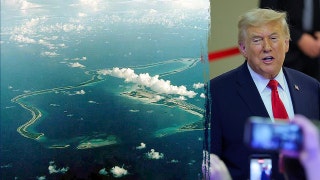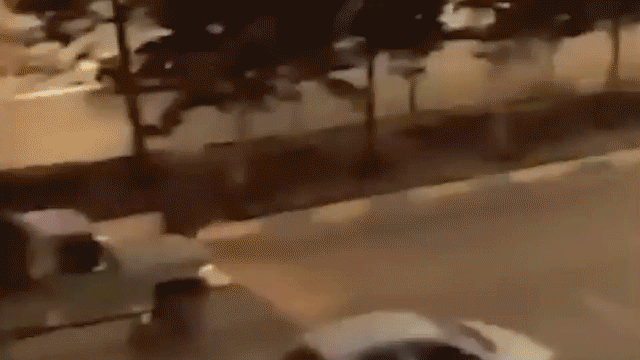
Edgar "La Barbie" Valdez Villarreal in August 31, 2010 in Mexico City, Mexico. (2010 Getty Images)
MEXICO CITY – Two weeks ago, Mexico's Interior Secretary Miguel Ángel Osorio Chong was adamant. No, the sudden decision to extradite 13 suspects to the United States, including two major drug lords, had nothing to do with last July's escape of Joaquín 'El Chapo' Guzmán, the world's most wanted man and alleged leader of the Sinaloa Cartel.
Even though Chapo's spectacular prison break embarrassed the Mexican government and infuriated Washington – which had requested his extradition just weeks before, to no avail – Osorio said his government was simply acting on bilateral agreements.
That may technically be correct, as the process of extraditing kingpins Edgar Váldez Villareal, alias “La Barbie,” Jorge “El Coss” Costilla Sánchez and 11 others began long before El Chapo fled.
But the timing, so soon after the Sinaloan's prison break, and the group being the largest the administration of president Enrique Peña Nieto has extradited since taking office in late 2012, did give the impression Mexico was trying to make up for something.
“You can safely say that choosing this moment to extradite these men is a direct consequence of Chapo's escape,” José Reveles, the author of numerous books on the drug war, told Fox News Latino.
“Peña Nieto's government was widely ridiculed over it,” he added. “Chapo was captured with American assistance [in February 2014] and was handed to us on a silver platter.”
“U.S.'s anger over his flight pressured the Mexican government into reconsidering its extradition policy,” he noted.
Until recently the Peña Nieto administration wasn't overly keen on sending kingpins to the United States, with the number of extraditions to the U.S. now totaling 56. His predecessor Felipe Calderón sent 52 across the border in his last year in office alone.
Indeed, collaboration between U.S. and Mexican law enforcement agencies reached unprecedented levels during Calderón’s time in office (2006-2012).
Peña Nieto has clearly taken a different approach, which many observers say it makes sense historically: his Institutional Revolutionary Party (PRI) ruled Mexico for 70 years in authoritarian fashion, championing national sovereignty and less inclined to bow to U.S. pressure than Calderón’s more conservative PAN party.
This was notably reflected in Secretary Osorio own words shortly after Chapo was captured last year, when answering a reporter’s about his extradition to the U.S. he said he would first have to spend “several centuries” in a Mexican jail.
“It's not just the mentality of this government, but that of the PRI in general,” said Mike Vigil, former Chief of International Operations of the Drug Enforcement Administration (DEA).
“Over the course of the PRI's history there was never a lot of cooperation with the U.S. For example," he added, "under Peña Nieto there is only a single point of contact for U.S. law enforcement to go to.
“We used to have a broader collaboration with different agencies, like prosecutors and the police, which I believe is necessary,” he told FNL.
By sending the group of La Barbie and El Coss northward, the single biggest extradited group since Peña Nieto took office, the administration is sending a powerful signal to the U.S. that it could be willing to cooperate more in the near future.
Observers say this is partly due to the embarrassment caused by Chapo’s spectacular escape, but also because Mexico's failing justice system is increasingly under international scrutiny.
One of the country’s main problems is its overcrowded and poorly functioning prisons, which, as Chapo shockingly showed, seem unable to keep the most powerful capos behind bars.
“Sending suspects abroad can be a tool to bring relief to some of bad prisons,” Reveles said, noting that La Barbie, El Coss and the other men extradited on September 30 were all inmates in Altiplano, the same prison Chapo escaped from.
“It's a very dysfunctional place; there have been murders, riots and hunger strikes in recent years. There's the constant threat of violence,” Reveles said about Altiplano prison.
A package of judicial reforms passed in 2008 is expected to make the justice system more transparent, efficient and accountable — but changes are taking a long time to implement.
Meanwhile, Vigil, Reveles and other observers expect Mexico to continue ramping the extradition of drug lords to the U.S., as there are still plenty of them – both jailed and at large – prosecutors north of the border would like to get their hands on.
They include Servando Gómez, alias "La Tuta," who led the Knights Templar cartel until his arrest in February of this year, and brothers Miguel Ángel and Omar Treviño Morales, former leaders of Los Zetas.
Other extraditable candidates belong to the "old guard" of the Mexican underworld, like the never arrested Ismael "El Mayo" Zambada, allegedly one of Chapo's closest lieutenants, and Rafael Caro Quintero, who purportedly led the powerful Guadalajara Cartel in the 1980's and is wanted by U.S. authorities for his alleged involvement in the killing of DEA operative Enrique Camarena in 1985.
Caro Quintero already served 28 years in Mexico but in another incident that caused a strain on U.S-Mexican relations, he was suddenly released in August 2013.
And, of course, there is Chapo himself. “If they ever manage to capture Chapo again, which is unlikely at this stage, I have no doubt he would be extradited this time,” Reveles said.
“They would capture him and put him on a plane to the U.S. the next day,” he added.








































